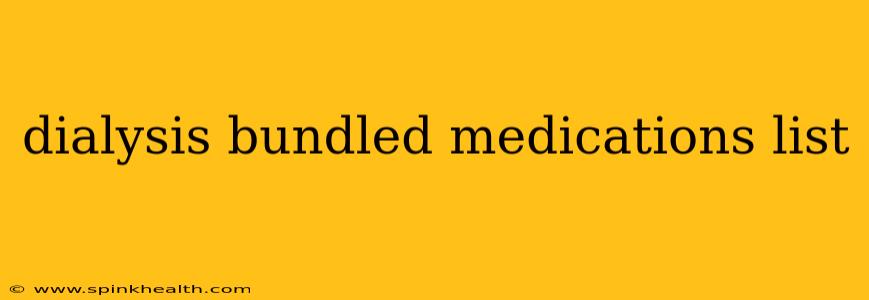Dialysis, a life-sustaining treatment for kidney failure, often involves a complex cocktail of medications. Understanding these medications, especially when bundled, is crucial for patients and their caregivers. This comprehensive guide delves into the world of dialysis bundled medications, addressing common questions and concerns.
Imagine this: Sarah, a vibrant 55-year-old, has been on dialysis for three years. Managing her medications feels like navigating a labyrinth. She's often confused about what each drug does and why they're bundled together. This is a common experience for many dialysis patients. Let's unravel the mystery together.
What are Dialysis Bundled Medications?
Dialysis bundled medications refer to a group of drugs often prescribed together for patients undergoing dialysis. These medications aren't just randomly combined; their synergy is carefully planned to address specific health challenges commonly associated with kidney failure. Bundling helps streamline medication management, potentially improving adherence and simplifying the patient's routine. However, the specific medications within a bundle can vary considerably depending on the individual patient's needs and health status.
What Medications are Typically Included in Dialysis Bundles?
The composition of a dialysis medication bundle is highly individualized, but some medications frequently appear:
- Erythropoiesis-stimulating agents (ESAs): These drugs, such as epoetin alfa or darbepoetin alfa, stimulate the production of red blood cells, combating anemia, a common complication of kidney disease.
- Iron supplements: Because ESAs require iron to function effectively, iron supplements, often intravenous iron, are frequently included in the bundle.
- Phosphate binders: These medications, like calcium acetate or sevelamer, help control high phosphate levels, which can lead to bone disease and cardiovascular problems.
- Vitamin D analogs: These help maintain healthy bones and calcium levels, often disrupted in kidney failure. Examples include calcitriol or paricalcitol.
- Antihypertensives: High blood pressure is common in dialysis patients, so medications to control blood pressure, like ACE inhibitors or ARBs, are often part of the regimen.
- Other medications: Other medications might be included depending on individual needs such as anti-nausea medication, anti-inflammatory drugs, or medications to manage other comorbid conditions (diabetes, heart disease, etc.)
What are the Benefits of Bundled Medications for Dialysis?
Bundling offers several advantages:
- Improved adherence: Simplifying the medication regimen makes it easier for patients to remember and take their medications consistently.
- Enhanced convenience: Receiving multiple medications at once reduces the number of clinic visits or pharmacy trips required.
- Cost-effectiveness (potentially): Depending on the insurance coverage and specific medications included, bundling might lead to cost savings compared to purchasing each medication separately.
- Better disease management: The synergistic effect of combined medications can lead to improved control of various complications associated with kidney failure.
What are the Potential Risks and Side Effects of Dialysis Bundled Medications?
While bundled medications offer many benefits, potential side effects must be considered:
- Individual medication side effects: Each medication in the bundle has its own potential side effects. For example, ESAs can increase blood pressure, and phosphate binders can cause gastrointestinal issues.
- Drug interactions: Interactions between drugs within the bundle or with other medications the patient takes are possible.
- Allergic reactions: Allergic reactions to any medication in the bundle are a potential concern.
How are Dialysis Bundled Medications Prescribed?
A nephrologist (kidney specialist) carefully selects and prescribes dialysis bundled medications based on a patient's individual needs, lab results, and overall health. Regular monitoring is essential to assess the effectiveness of the treatment and adjust the medications as needed.
What are the costs associated with dialysis bundled medications?
The cost of dialysis bundled medications varies greatly depending on the specific medications prescribed, insurance coverage, and the patient's location. It's essential to discuss these costs with your insurance provider and healthcare team.
How often are Dialysis Bundled Medications Adjusted?
The frequency of adjustments to dialysis bundled medications varies, but regular monitoring of blood tests and clinical evaluations is crucial to optimize the therapy and manage potential side effects. The dosage of some medications may need to be increased or decreased based on the patient's response.
In Sarah’s case, understanding the rationale behind her bundled medications—the why and the how—empowered her to actively participate in her treatment, leading to better management of her condition. It's vital for every dialysis patient to have an open and honest conversation with their nephrologist to fully grasp the benefits and potential risks associated with their medication regimen. This approach contributes to a more successful, and less daunting, dialysis journey.

